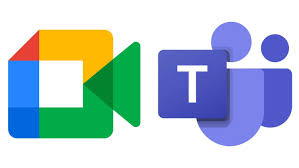Last Updated on March 13, 2024 by Marketing Team

Google Meet or Microsoft Teams
In the dynamic landscape of digital communication and remote collaboration, two major players stand out – Google Meet and Microsoft Teams. As organizations continue to embrace virtual work environments, the choice between these two platforms, Google Meet and Microsoft Teams, becomes increasingly crucial. Let’s dive into the details and unravel the differences that set Google Meet and Microsoft Teams apart, exploring their unique features and capabilities in shaping the future of virtual collaboration.
User Interface and Accessibility:
Google Meet boasts a clean and intuitive user interface, seamlessly integrated with other G Suite apps. Its simplicity makes it easy for users to join meetings with just a click, fostering a user-friendly experience. On the other hand, Microsoft Teams offers a feature-rich interface, providing a centralized hub for team collaboration. The platform’s integration with Microsoft 365 apps facilitates a unified user experience, enabling users to access files, chat, and meetings from a single interface.
Video Conferencing Capabilities:
When it comes to video conferencing, both Google Meet and Microsoft Teams offer high-quality audio and video. Google Meet is known for its reliability and ease of use, supporting up to 100 participants in a meeting. Meanwhile, Microsoft Teams goes a step further, accommodating larger groups with a maximum of 300 participants. Teams also provides additional features like breakout rooms, hand-raising, and meeting recordings, enhancing the overall meeting experience.
Collaboration Tools and Integration:
Google Meet is seamlessly integrated with other G Suite applications like Google Drive, Docs, and Sheets, fostering collaboration in real-time. This integration allows users to share and co-edit documents during meetings. Microsoft Teams, being part of the Microsoft 365 suite, offers a robust set of collaboration tools, including file sharing, co-authoring, and integration with popular Microsoft apps like Word and Excel. The choice between the two depends on the existing software ecosystem within an organization.
Messaging and Communication:
While Google Meet focuses primarily on the video conferencing aspect, Microsoft Teams positions itself as a comprehensive communication platform by integrating features like SMS. The decision between the two platforms, therefore, hinges on the communication needs of your team and the extent to which features like SMS integration align with your organization’s communication strategy. Whether it’s the collaborative channels within the Teams platform or the added versatility of SMS, Microsoft Teams offers a robust suite of communication tools to meet the varied needs of modern workplaces.
Security and Compliance:
Security is a top priority in virtual collaboration tools, and both Google Meet and Microsoft Teams prioritize user data protection. Google Meet leverages Google’s robust security infrastructure, with features like encryption in transit and at rest. Microsoft Teams, being part of the Microsoft 365 suite, adheres to industry-leading security standards, providing features such as data loss prevention and multi-factor authentication. The choice between the two depends on an organization’s specific security and compliance requirements.
In the ever-evolving landscape of remote work, the choice between Google Meet and Microsoft Teams depends on the unique needs and preferences of your organization. Google Meet offers simplicity and seamless integration with G Suite, while Microsoft Teams provides a comprehensive collaboration hub with a focus on chat and extensive integration with Microsoft 365 apps. Consider factors like team size, existing software infrastructure, and collaboration preferences to make an informed decision that aligns with your organization’s goals. Whether you lean towards the simplicity of Google Meet or the feature-rich environment of Microsoft Teams, both platforms play pivotal roles in shaping the future of virtual collaboration.
For more information on Microsoft Teams calling and texting.
